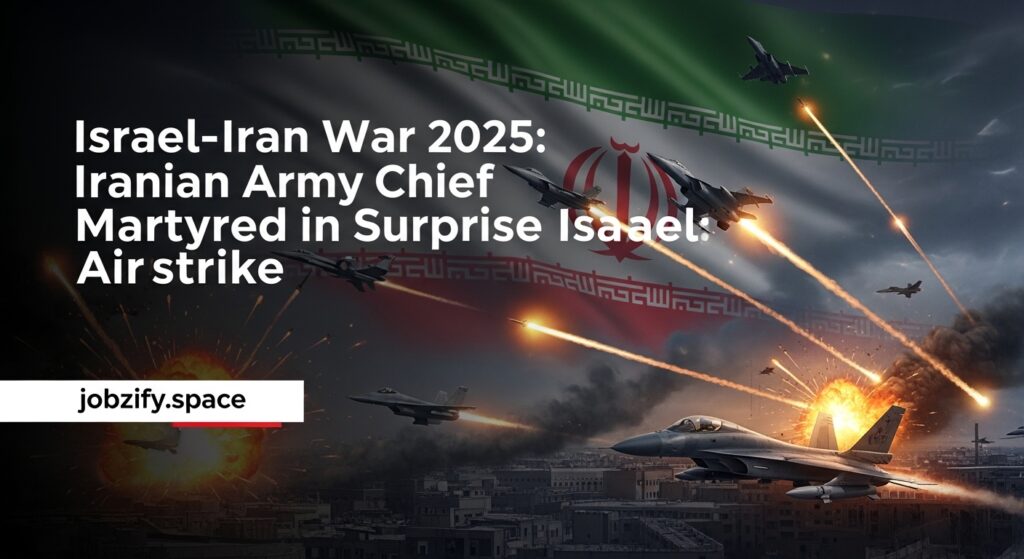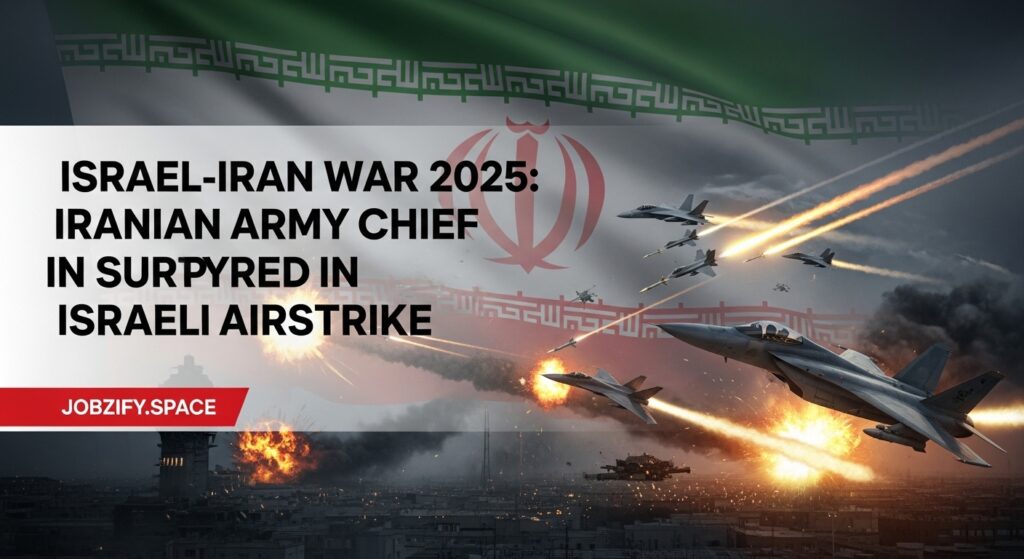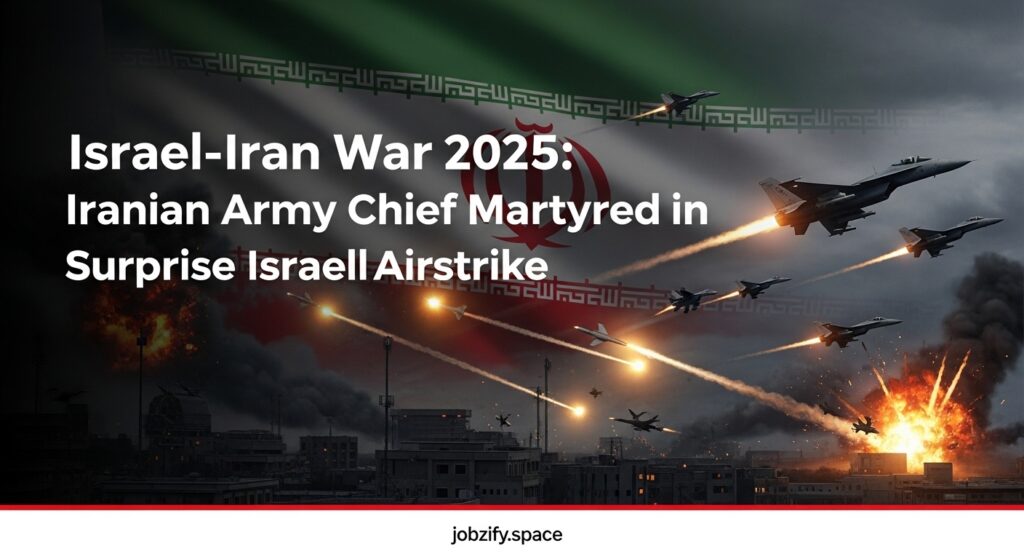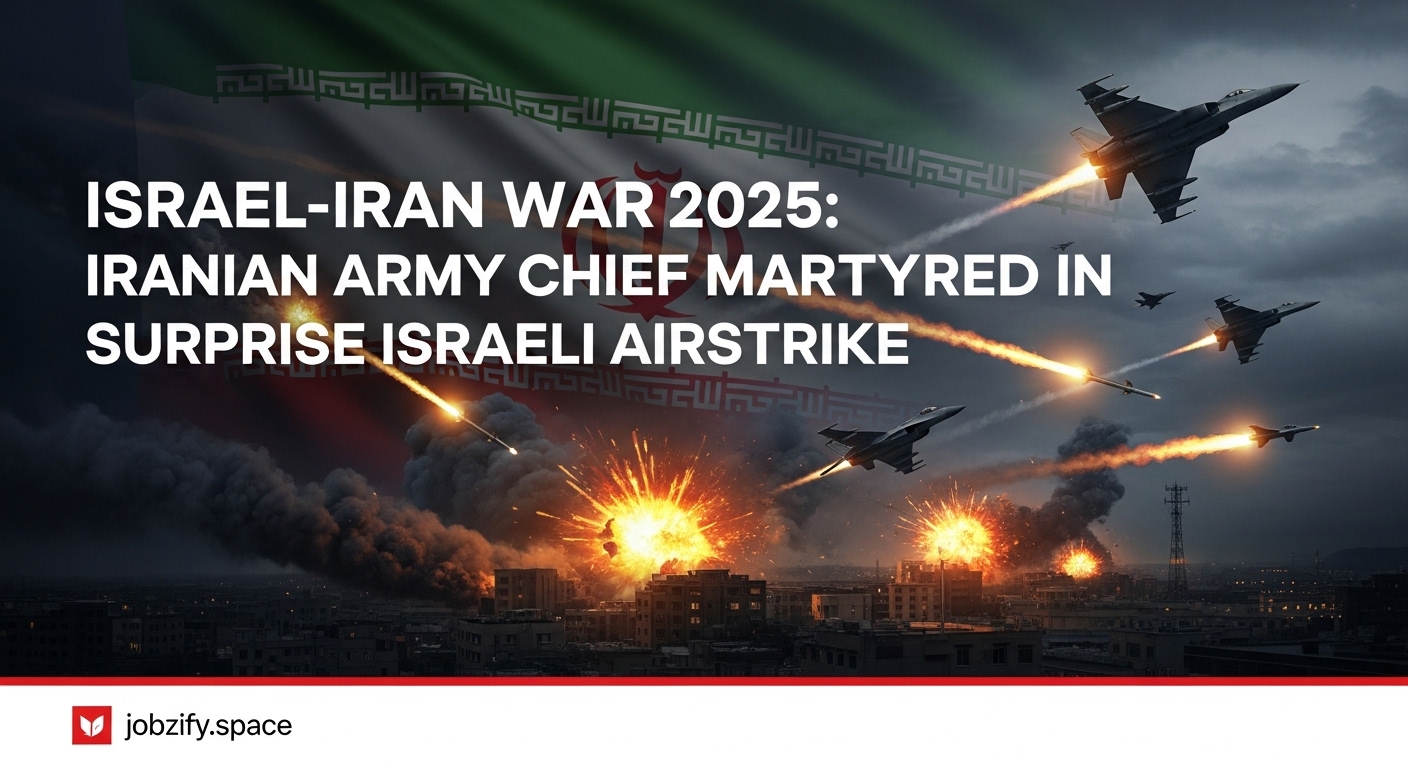Breaking: Israel-Iran Israel launches a powerful airstrike on Iran in June 2025, killing Iranian Army Chief Mohammad Bagheri. Explore full attack details, global reactions, and what this escalation means for Middle East peace.
In a stunning turn of events that shook the geopolitical landscape of the Middle East, Israel launched a surprise military operation on Iran in June 2025. The operation led to the martyrdom of several top Iranian military officials, including Major General Mohammad Bagheri, Iran’s Chief of the Armed Forces. As news of the assault broke globally, markets reacted sharply, defense analysts warned of escalation, and international leaders called for urgent de-escalation.
Table of Contents
Timeline of the Attack: Israeli Airstrike
On June 13, 2025, Israel initiated “Operation Rising Lion”, a coordinated and high-precision airstrike mission targeting Iran’s:
- Nuclear enrichment facilities
- IRGC (Islamic Revolutionary Guard Corps) military bases
- Strategic missile development centers
- Communication and command infrastructure
According to Israeli officials, the operation was launched based on intelligence indicating an imminent nuclear threat from Iran.
Within a few hours, Iranian state media reported multiple casualties, including the martyrdom of Major General Mohammad Bagheri, along with other high-ranking military leaders.

Who Was General Mohammad Bagheri?
Major General Mohammad Bagheri served as the Chief of the General Staff of Iran’s Armed Forces. A prominent figure in Iran’s military doctrine, Bagheri was:
- A veteran of the Iran-Iraq War (1980–1988)
- Chief architect of Iran’s asymmetric warfare doctrine
- Key strategist behind Iran’s missile development and regional proxy influence
His death has been described as the biggest blow to Iran’s military leadership since the assassination of Qassem Soleimani in 2020.
Israel’s Motivation: Israel-Iran War
According to Israeli Prime Minister Benjamin Netanyahu, the operation was a “preemptive strike” to prevent Iran from acquiring nuclear weapons.
Key reasons cited by Israel:
- Iran’s recent advancements in uranium enrichment, surpassing 90% purity
- Israeli intelligence reports of nuclear warhead testing under covert supervision
- Fear of Iran’s growing ballistic missile capabilities
- Escalating Iranian influence in Syria, Lebanon, and Gaza through proxy groups like Hezbollah
In a televised address, Netanyahu said:
“Israel will never allow a regime that chants ‘Death to Israel’ to possess nuclear arms. This was a necessary step.”

Martyrdom of Iranian Military Leaders: Israel-Iran
1. Major General Mohammad Bagheri
- Position: Chief of General Staff
- Role: Supreme Commander of Iranian military forces
- Death: Confirmed via Iran’s state-run media and global defense analysts
2. Major General Hossein Salami
- Commander of the IRGC
- Played a crucial role in regional defense strategies
3. General Gholam Ali Rashid
- Known for military reforms and missile guidance programs
4. Multiple IRGC Brigadier Generals and nuclear scientists
- Not officially named but confirmed dead by IRGC news outlets
Attack Impact: Military and Civilian Damage
The attacks targeted areas near Tehran, Isfahan, Natanz, and Bushehr, resulting in:
- Destruction of three nuclear research facilities
- Loss of communication networks used by the Iranian Armed Forces
- Civilian casualties and infrastructure damage, especially near Natanz
- Reports of radiation leaks being investigated by the IAEA
The Iranian Air Force scrambled jets but failed to stop the Israeli drones and fighter aircraft. Iran’s S-300 air defense systems were also compromised during the assault.
Iran’s Reaction: A Vow for “Severe Revenge”
Iran’s Supreme Leader, Ayatollah Ali Khamenei, vowed “a punishment Israel will never forget”. The Iranian government declared:
- Three days of mourning for the martyred generals
- Full mobilization of the IRGC and regular armed forces
- Possible closure of the Strait of Hormuz, a key global oil supply route
IRGC spokesperson General Ramezan Sharif stated:
“The blood of our martyrs will not be in vain. Tel Aviv and Haifa will pay the price.”
Global Reactions: Israel-Iran
United Nations (UN)
The UN Secretary-General urged restraint and convened an emergency session of the Security Council.
🇺🇸 United States
Although not directly involved, the U.S. confirmed that it was aware of Israel’s operation in advance but did not participate. President Donald Trump called the situation “dangerous but necessary.”
🇷🇺 Russia & 🇨🇳 China
Both countries condemned the Israeli strike, calling it a violation of international sovereignty and urging a diplomatic resolution.
🇬🇧 🇫🇷 🇩🇪 European Union
The EU has urged both parties to return to diplomatic negotiations and avoid a full-blown war in the Middle East.
Economic Fallout: Oil Prices Surge
Global markets responded immediately to the conflict:
- Brent crude oil prices spiked to $108 per barrel
- Stock markets in Asia and Europe saw significant drops
- Gold prices rose due to increased demand for safe-haven assets

Strategic Implications: Israel-Iran
This strike marks a new era of direct warfare between Israel and Iran, moving beyond proxy battles into nation-on-nation warfare.
Possible Consequences:
- Full-scale war in the Middle East
- Activation of proxy forces: Hezbollah, Houthis, PMF in Iraq
- Increased risk to U.S. troops in the region
- Disruption in oil supply chains
Social Media & Public Sentiment
Hashtags like #IranUnderAttack, #OperationRisingLion, and #Bagheri trended worldwide on X (Twitter) and Instagram, with global users expressing shock, support, or condemnation depending on their political alignment.
What Could Happen Next?
1. Iranian Missile Retaliation
- IRGC has vowed to hit strategic targets in Israel
- Potential strikes on U.S. bases in Iraq, Syria, and the UAE
2. Cyber Warfare
- Iran is likely to launch cyberattacks on Israeli infrastructure
- Israel may respond with digital retaliation
3. Diplomatic Crisis
- Talks on the JCPOA nuclear deal may collapse
- Other regional countries may be pulled into the conflict
Summary Table: Israel-Iran
| Element | Details |
|---|---|
| Attack Date | June 13, 2025 |
| Operation Name | Operation Rising Lion |
| Iranian Army Chief Martyred | Major General Mohammad Bagheri |
| Total Military Deaths | Estimated 8 high-ranking officials + 50+ military personnel |
| Israeli Objective | Prevent Iran’s nuclear weapon development |
| Iran’s Reaction | Military mobilization and vow of retaliation |
| Global Impact | Oil prices surged, UN emergency session convened |
Final Thoughts: Israel-Iran
The Israel-Iran conflict of June 2025, marked by the martyrdom of Major General Mohammad Bagheri, has plunged the Middle East into one of its tensest periods in decades. As both sides prepare for what may come next, the international community holds its breath.
Whether this conflict escalates into a broader war or is contained through diplomacy remains uncertain. However, one thing is clear: the military and emotional loss of Iran’s top generals will not go unanswered.




